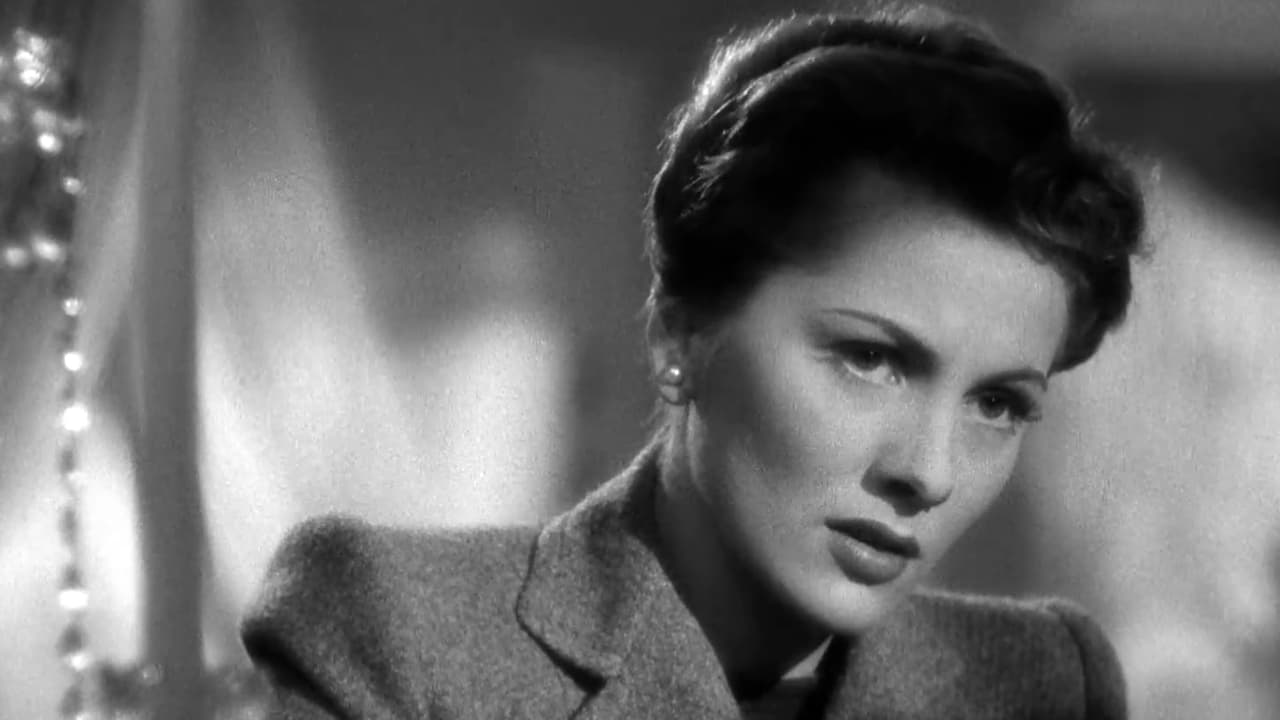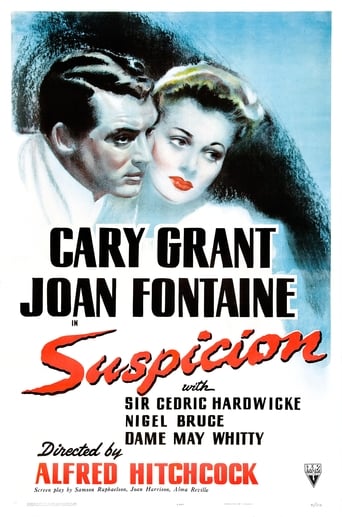Alicia
I love this movie so much
AniInterview
Sorry, this movie sucks
ChanFamous
I wanted to like it more than I actually did... But much of the humor totally escaped me and I walked out only mildly impressed.
Winifred
The movie is made so realistic it has a lot of that WoW feeling at the right moments and never tooo over the top. the suspense is done so well and the emotion is felt. Very well put together with the music and all.
Hitchcoc
I suppose it's not fair to vilify a movie because of the ending. We all know the stories of the original novel, where we are brought into the plot by the now dead narrator. But Cary Grant was too good looking and portrayed as too good a guy to allow him to be a baddie. Of course, he is an embezzler and a crook and doing all kinds of anti-social things. He marries a woman so he can steal her insurance money. So committing murder is only a matter of degrees. Hitchcock does a good job of leading us through all the evil doings. Lynn Fontaine, who won the Oscar, just can't pull the trigger on this guy and be done with him. Anyway, what could have been a great movie is pretty much spoiled by one of the most contrived endings I've ever seen.
elvircorhodzic
When the movie "SUSPICION" is concerned, I am almost certain that the director somehow inhibited. In this film Hitch remained incomplete. I was wondering if it comes to interpretation of the novel, actors, censorship or disagreement to the production. The director certainly did not fail in his distinctive segments. The atmosphere is classy, complications are good (maybe a little predictable), suspense and tension are constant. The place is exciting, but abrupt and I think that the director rushed to this work completed as soon as possible.A fruity and cheerful drama yarn in a strong psychological mystery. I doubt that the director ran out of material, because the story is intriguing.Joan Fontaine as Lina McLaidlaw Aysgarth, was shy, but rich spinster who begins to suspect her husband. I am convinced that her doubts about the marriage started an avalanche. For that reason, the end of the film is not logical. Suspicion has changed her personality. Fontaine was good.Cary Grant as Johnnie Aysgarth is charming seducer who is at the end turns out to be irresponsible and wasteful playboy. I think it was Grant better pace in the first part of the film. I am not thrilled with the change in the character of his "hero" in the second part of the film. Grant is well directed acting, but just something missing. Apparently the director saved him at the end of the film.Hitchcock is a little "crooked". Lack of originality. However, this psychological thriller is from start to finish exciting.
vincentlynch-moonoi
This is one of my favorite Cary Grant films, although it is certainly not at the top of my Alfred Hitchcock picks. I thought I had already reviewed it, and was coming on the site to update because I had just upgraded to the new Blu Ray edition. A comment about that first. I do not feel that the upgrade from regular DVD to Blu Ray is, in this case, worth it; the improvement is marginal.Joan Fontaine (Lina) is a bookish, almost spinsterish young woman who stumbles upon an intriguing ne'er-do-well (Johnnie Aysgarth), played by Cary Grant. When Fontaine hears her parents (Sir Cedric Hardwicke and Dame May Witty) in a conversation where they discuss the unlikelihood of her ever marrying, she falls in love with Grant, almost in spite of her parent's viewpoint. But, she soon is in real love with Grant, and they marry rather quickly. Into the picture comes Nigel Bruce as sort buffoonish 'Beaky', whom Grant sort of watches out for...or does he. In one incident after another, Grant disappoints Fontaine: first he turns out to have no job or income, then he gets a job...and secretly loses it, and then he sells her father's prize chairs without her permission. She begins to like Beaky, and it begins to appear that Grant may plan on murdering the silly man to gain his money in a business deal. Sure enough, Bruce dies, and Grant's involvement seems almost a certainty. And then, the question becomes: will he also murder FOntaine...by poisoned milk? Or does he finally become a man?Cary Grant is my favorite actor (or at least tied with Spencer Tracy). And he is perfect for his role here...and plays it to maximum effect. On the other hand, although I don't dislike her, I'm not a fan of Joan Fontaine...but in watching this film this time around, I have to admit that Fontaine (who won the Academy Award for this performance) literally steals the show. Sir Cedric Hardwicke and Dame May Witty have very minor roles here. Important to the film, but very brief. Nigel Bruce's role is more substantial, and he is good in it, but I sometimes tire of him always playing the buffoon.It's difficult to find much wrong with this film. It is in Hitchcock's more subtle career phase...which I much prefer. Apparently the film is MUCH different than the novel; the film leaves out all of Grant's infidelities. And, instead of being a real cad (as in the book), the film becomes more a tale of a woman with suspicions. Today, I'm sure the film would be a very much different one.
atlasmb
In "Suspicion", Hitchcock takes the audience on a ride. The story starts by mixing two seemingly incompatible people--Cary Grant as Johnnie and Joan Fontaine as Lina--and making them a couple. She is a studious, introspective, conservative woman and he is an impetuous, impertinent, immature extrovert. Their joining is the recipe for some kind of discord.Lina is the viewer's avatar in the film. Notice how the story follows her point of view. Much of the circumstantial evidence that points to Johnnie's guilt is viewed through her eyes, conveyed through her external clues to inner turmoil in a great performance by Fontaine. Note the way Hitchcock lights the interior of their home--usually with a multitude of shadows. He frames Lina with the shadows of the large window, a cage, making her a prisoner of her own love for Johnnie.The dream of happiness that was the center of their honeymoon becomes a nightmarish roller coaster ride of emotions as soon as they return home. Lina is an amateur regarding relationships, so it takes her a while to understand her feelings and to learn what limits her fidelity has.As the evidence--circumstantial and otherwise--piles up (perhaps a little too neatly), Hitchcock asks the viewer to understand Lina's confusion and her ambivalence. But it is human nature to want to exhaust every last shred of doubt in defending one's love, so we take the journey with Lina until finally there is only certainty. The script is very tight and cleverly written and the score is lush, accenting the emotional highs.Hitchcock wanted a darker ending, but still managed to create an ending that delights in having taken the audience for a ride. He would get his darker ending two years later, with "Shadow of a Doubt". In both cases, note how he uses a waltz theme for the one under suspicion.I thoroughly enjoyed this film. It is filled with prototypical Hitchcockian elements (e.g. his focus on her hair). Joan Fontaine's performance alone--so nuanced, especially when compared to some other portrayals of women spiraling toward a breakdown--makes the film worth watching.

